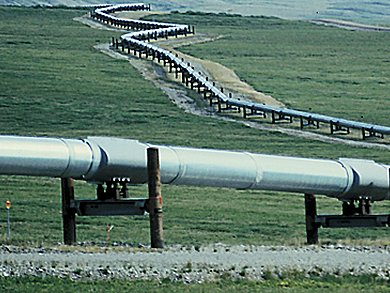Existing gas pipelines might be an efficient alternative for moving ethanol fuel around. But researchers around J. W. Sowards, National Institute of Standards and Technology (NIST), USA, presented new experimental evidence that Acetobacter aceti bacteria that feed on ethanol and produce acid boosted fatigue crack growth rates by at least 25 times the levels occuring in air alone.
The tests were performed on X52 and X70 pipeline steels, which are alloys of more than a dozen metals. Simulated fuel-grade ethanol significantly increased crack growth at stress intensity levels found in typical pipeline operating conditions, but not at low stress levels. The cracking is related to corrosion.
The finer-grained X70 steel had lower rates of crack growth at all stress levels. This was expected because larger grain size generally reduces resistance to fatigue.
Preliminary tests suggested that glutaraldehyde, a biocide used in oil and gas operations, may help control bacterial growth during ethanol transport.




